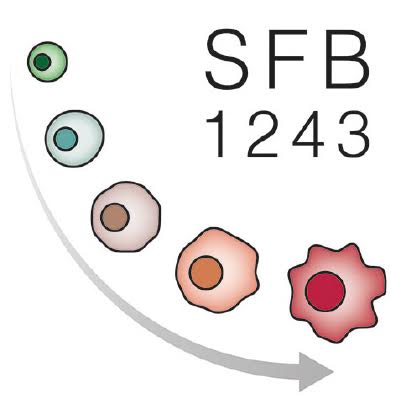 The Challenge
The Challenge
Although many mechanisms and pathways of tumor formation are known, providing efficient targeted therapies to treat cancer, the frequent emergence of resistant tumor cells and cancer relapse present an immense clinical challenge. Recent technological developments, such as high-throughput sequencing, single cell genomics and genome engineering, now open unprecedented possibilities to study cancer evolution and its molecular mechanisms. Hematologic neoplasms such as leukemias and lymphomas are well suited to study cancer evolution because intact cells can be sampled and studied in detail during disease progression.
Our Goals
In an evolutionary framework we will study different aspects of cancer evolution, in particular the poor prognosis of acute myeloid leukemia and indolent lymphomas, with an interdisciplinary approach. We will study the molecular mechanisms, measure the evolution of genetic, epigenetic and transcriptional heterogeneity in patients, mice and cellular systems and will use computational models to quantify relevant parameters. The close collaboration of clinicians, molecular biologists, population geneticists, computational and evolutionary biologists should result in a basic understanding of the evolutionary dynamics of tumors. With this interdisciplinary evolutionary-guided approach, our research consortium will contribute to the development of better diagnostics, predictions and ultimately treatment options for cancer patients.
Applications
For information about the individual projects and the IRTG graduate program, please see http://www.sfb1243.bio.lmu.de
Online applications for doctoral and post-doctoral positions are now being accepted until February 20, 2016. We will make every effort to expedite the selection process so that positions can be filled as soon as possible.
For doctoral project applicants: You should hold an academic degree qualifying you for a doctoral position in the field of biology, chemistry, bioinformatics or medicine. Medical School graduates have the opportunity to pursue a PhD Medical Research. Life Science graduates should have a master’s degree. Exceptional candidates with a bachelor of honors (advanced degree) may be considered.
For postdoc positions (see projects A01, A10, A14, Z02): Please include additional information and documents concerning your doctorate.
Applications must be submitted in English or in German. Documents in other languages must be accompanied by certified translations. Applicants with degrees from China must provide APS certificates for each degree. Translations and APS certificates should be incorporated into the PDF of the reference document.
The following documents should be submitted:
- Curriculum Vitae not exceeding 2 pages,
- Documentation for qualifying academic degrees (PDFs of transcripts, degree certificates),
- Short summary of master’s thesis and doctoral thesis, if applicable (250 words each),
- Motivational essay elaborating on your motivation driving your interest in this position, including what you expect to contribute to the project, in approx. 500 words.
- Contact information for two references.
The institutions contributing to this project are equal opportunity employers and encourage applications from female candidates. Disabled candidates with essentially equal qualifications will be given preference.

